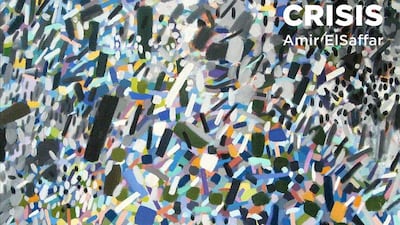Amir El Saffar played New York University Abu Dhabi at the weekend with his 17-member big band. His most recent album, Crisis, features his smaller Two Rivers Ensemble, a sextet, but is no less effective in showcasing the jazz virtuoso's impressive range.
The nine-track album moves rapidly through many different genres, from modal jazz (think Miles Davis and John Coltrane) to more traditional Middle Eastern music. We hear the trumpet, vocal and santour – all played by El Saffar – as well as saxophone, drums, bass, buzuq (an Oriental long-necked lute), oud and percussion.
Three of the nine pieces are composed around poems. Love Poem is based on words by the 12th and 13th century Andalusian Sufi poet Ibn Arabi; the composition appears in two versions on the album. Introduction – From the Ashes meanwhile, includes words by the 19th century Mosul-born poet Abdul Al Akhras.
El Saffar’s voice, although not typically powerful, does well, with a light but warm timbre. However, he has increasingly established himself as a trumpeter and his mastering of Oriental scales is exemplary.
We also hear Egyptian folklore in El Shaab (The People). El Saffar spent time in Egypt around 2011, when popular protests led to Hosni Mubarak stepping down. The track has a haunting groove.
Crisis also explores the state of the region, particularly Iraq. Flyover Iraq and Taksim Saba are haunting and yearning. Aneen (Weeping), Continued is telling too. The composition is based on a sad sounding scale typically used in Iraqi music, which is called the maqam mukhalaf (the upside-down maqam), which, as the liner notes of the album explain, is said to evoke the sighs of the survivors of the fall of Baghdad in 1258, at the hands of the Mongols, which led to a huge massacre. The album booklet does not explain who The Great Dictator is.
Tipping Point opens with tranquil solo and duet improvisations but then moves to a repeated explosive ensemble playing. The liner notes describe the piece as "simultaneously pulling in multiple directions". Apart from being a wrapping-up of many musical ideas on the album, the composition is also indicative of where El Saffar wants to keep heading: multiple directions, with the freedom of switching between them as he thinks best.
Neil van der Linden organises music events in the Mena region.

